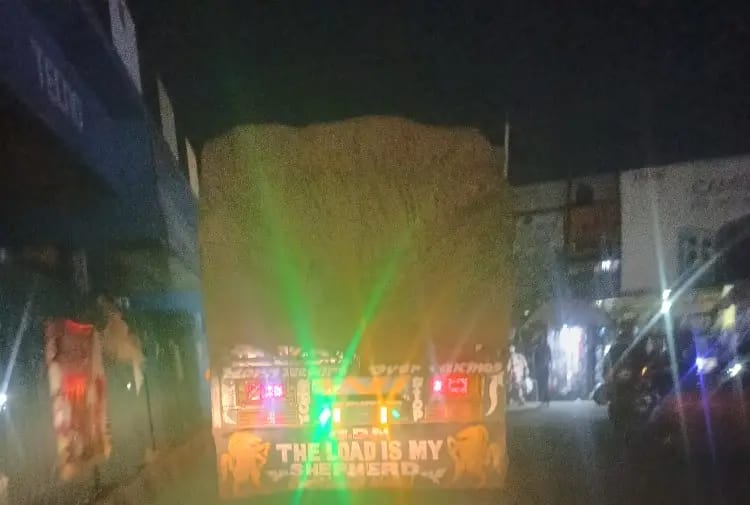

The headline, “The Load Is My Shepherd,” is not an attempt to twist or rewrite the biblical phrase, “The Lord Is My Shepherd.” Instead, it is a somber reflection on our collective struggles as a nation and as a people. It speaks to the burdens we carry—both seen and unseen—that have, over time, come to define our existence.

I found myself lost in thought during one of my usual kurukere runs—those unplanned yet revealing drives across town. On this particular Wednesday evening, I was heading toward Mokola Roundabout in Ibadan, the capital of Oyo State. As I navigated through the familiar roads, something ahead caught my attention.
A heavily loaded truck lumbered forward on the road beside the flyover, heading towards Sango. But it wasn’t the truck itself that intrigued me. Nor was it the weight of its cargo—whatever it may have been. After all, I am not a police officer, nor am I with the Nigeria Customs Service, NDLEA, or Federal Quarantine. I am just a journalist with an insatiable curiosity, always looking for meaning in the ordinary.
What truly captured my attention was the bold inscription on the back of the truck: “THE LOAD IS MY SHEPHERD.”
A Chase for Meaning
Without thinking twice, I gave the truck a hot chase. With my phone camera on high alert, I maneuvered through traffic, determined to capture the inscription. Passersby cast curious glances my way, some outright staring. Perhaps, they wondered why a lone driver was in such relentless pursuit of a moving truck.
But I was undeterred. My mission was clear—I needed to document this, if only for comic purpose. After several snapshots, I finally got what I wanted. The truck moved on, oblivious to the impact its message had just made on me.
At first, I chuckled. I considered it nothing more than an amusing grammatical mishap, one of the many scattered across our highways. Such errors are common and often serve as comic relief. But upon deeper reflection, the phrase struck me as a stark metaphor for our collective struggle in a nation where burdens—both personal and systemic—have become the guiding forces in people’s lives.
But as I reflected on the words, the laughter faded. I began to see the inscription in a different light.
A metaphor for a nation’s struggles
“The Load Is My Shepherd.”
It was no longer just a wrongly written phrase. It had become a powerful metaphor for the Nigerian reality. In a country where millions wake up daily to wrestle with poverty, hardship, and uncertainty, burdens have indeed become their shepherds. Rather than being led by hope, faith, or opportunity, people are now driven by the weight of survival. Their loads determine how they interact with the world.
It is a sad reflection of our times.
In the midst of extravagant and reckless opulence displayed by the privileged few, the vast majority of Nigerians are left to fend for themselves. Hunger, poverty, and despair are no longer the exception but the norm. Every day, people carry burdens—some self-inflicted, but most imposed by a broken system. These burdens have, over time, transformed into an unshakable force, dictating how people navigate their lives.
The load has become their shepherd.
The Death of Communalism
Burdens—some self-inflicted but most imposed by a broken system—have transformed into a monstrous force, shaping our national psyche. The spirit of communalism that once defined us has withered away, replaced by a dog-eat-dog mentality where everyone carries their cross alone.
Once upon a time, we were our brothers’ keepers. But today, survival has taken precedence over solidarity. The communal spirit that once defined us has withered away, replaced by a harsh reality where everyone carries their cross alone.
Rather than looking out for one another, Nigerians have embraced a self-first mentality. The weight of personal struggles has made many indifferent to the suffering of others. We now see and relate to one another through the narrow lens of self-preservation.
As survival takes precedence over solidarity, we have become a society of isolated individuals, each navigating life’s harsh realities.
In this relentless pursuit of survival, individualism reigns supreme. The bonds of community have weakened, and society has become a battlefield where only the fittest thrive. Rat race—that is what it has become (apologies to Bob Marley).
Scarcity Amidst Abundance
Renowned broadcaster and former Nigerian Ambassador to the Philippines, Dr. Yemi Farounbi, once remarked:
“What we have is enough to meet the needs of the greatest number of Nigerians, but not enough to satisfy the greed of the privileged few.”
How painfully true!
Nigeria is a country blessed with immense resources. Yet, the suffering of the people tells a different story. In the midst of plenty, millions live in deprivation. The wealth of the nation is concentrated in the hands of a few, while the majority struggle to make ends meet.
And the question remains: For how long?
For how long will the masses continue to groan under the weight of hardship? When will the forces of change disrupt this cycle of suffering? When will the inertia that keeps us trapped in this endless struggle finally give way to transformation?
Until that time comes, our anthem remains:
“The Load Is My Shepherd.”
Rather than “The Lord Is My Shepherd,” we will continue to navigate life under the weight of burdens that refuse to let go.
This is just another reflection from a heart burdened by the state of our nation.









